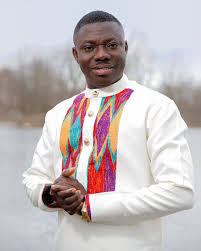Holy’ Convictions Prevent Gospel Events from Securing Sponsorships — Kingsford Menkah

US-based Ghanaian gospel singer Kingsford Menkah has sounded a wake-up call to the gospel music industry, highlighting a critical challenge that continues to affect sponsorship opportunities for gospel concerts and events. According to Menkah, the root cause of the persistent sponsorship drought lies in a conflict between gospel artistes’ religious values and the commercial demands of potential corporate sponsors.
Speaking during an interview with Graphic Showbiz on July 15, 2025, Menkah explained that while many companies are eager to sponsor gospel events due to their large and engaged audiences, gospel artistes often fail to uphold their end of the sponsorship agreements. This failure primarily results from their reluctance or refusal to promote certain products or brands that contradict their religious beliefs.
“It has almost become cliché that gospel concerts struggle to attract sponsorships, but this problem stems from our so-called ‘holy’ attitudes,” Menkah remarked. He elaborated that expecting a company whose products—such as alcoholic beverages or contraceptives—clash with gospel teachings to invest in an event where their products won’t be promoted is unrealistic.
“Companies are not charities; they are businesses seeking returns,” he said. “If we cannot offer sponsors value, such as endorsing their products, they have no incentive to support us.”
Menkah attributed the sponsorship challenges to a fundamental mismatch between the values upheld by gospel artistes and the expectations of corporate sponsors. “Business is business,” he asserted. “Once you sign a deal, it’s not about morality anymore. You either align with the sponsor’s requirements or step aside.”
The issue of limited sponsorship in the gospel industry has been a hot-button topic, especially since last year when leading gospel musicians such as Joe Mettle, Ohemaa Mercy, and Diana Hamilton publicly voiced their frustrations about the difficulties in securing corporate backing for their events.
Ohemaa Mercy, in particular, sounded an urgent call to corporate Ghana, warning that the gospel music scene in the country was in a precarious state. Comparing the situation to a critically ill patient on life support, she urged corporate entities to come to the rescue, cautioning that without support, gospel events might face extinction.
However, Menkah insists that gospel artistes must also take responsibility for their part in attracting sponsorship by developing strong personal brands that appeal to companies aligned with their values.
“Many gospel musicians still think branding is only for secular artistes, and that’s a mistake,” Menkah said. “Frankly, gospel artistes often rely on cheap labor and lack adequate business education.”
He emphasized the need for gospel artistes to engage professional brand managers who understand how to package and position their work to attract sponsorships. “A skilled brand manager can make your brand attractive to investors and sponsors. Relying on informal help without proper training is a major drawback.”
Menkah’s insights underscore a broader need for gospel artistes to approach their careers with a business mindset, understanding that successful sponsorship deals require compromise and professionalism.
Meanwhile, Menkah himself is currently promoting his new single, Tomorrow, which carries a message of hope for those facing discouragement and shattered dreams. Released earlier this month, the song is gaining significant airplay on radio and streaming platforms, resonating with audiences both in Ghana and abroad.
The singer’s observations come at a time when the gospel music industry in Ghana is grappling with funding challenges that threaten the sustainability of large-scale events. As corporate sponsors weigh the commercial benefits of sponsorships against potential conflicts with their products’ promotion, the gospel industry’s ability to adapt to these realities could determine its future growth and success.
In conclusion, Kingsford Menkah’s candid remarks call for a balanced approach where gospel artistes remain true to their faith while embracing the commercial aspects of the music business. This alignment, coupled with professional branding and strategic partnerships, could unlock the sponsorship opportunities gospel music has long sought, ensuring vibrant, well-funded events that continue to uplift audiences nationwide.






